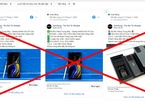However, Clause 2, Article 38, Section 2, Chapter III of the Decree 38 on violations of advertising on electronic newspapers and websites has provoked debates.
Specifically, some people showed their concerns about the regulation "The maximum activation latency of the advertisements is 1.5 seconds"; “Designs of Ads can be mixed with newspaper content”, will be a disadvantage for press agencies in comparison to international advertising platforms such as Google, Facebook, which allow viewers to skip ads after at least five seconds.
According to the Vietnam Advertising Association, advertisements in newspapers of domestic enterprises will be affected by the decree, while it will be of great benefit to international advertising enterprises inadvertently.
To place advertising in newspapers or official media, businesses will have to meet legal requirements and requirements of quality of products and services. These requirements help for greater control over ad content. Meanwhile, online advertisings with violations are gradually becoming a favorite place for unauthorized advertising and offensive advertising.
Lately, a lot of offensive clips, images, and online advertisings have annoyed audiences and an ad comes between viewers and their films, or favorite program affects their emotions.
Many ads do not stop if the viewer does not press the skip button, even many ads even force the viewer to watch the entire content without having the option to turn it off. In addition, many websites and newspapers easily allow ads to appear in articles.
In fact, international social networking platforms have been gradually eating up the advertising market share in the press and media. Facebook and Google currently lead in terms of market share and online advertising sales in Vietnam, with over 80 percent of total revenue.
Each year, the total revenue of Vietnamese e-newspapers is just over VND4 trillion (US$ 173,243,336), accounting for about 20 percent-25 percent of the total online advertising costs (about VND14,500 billion); hence, approximately VND10 trillion has gone into the pockets of international advertising corporations.
Besides, the regulations in advertising still have some inadequacies. For instance, though the Law on Advertising 2012 and the Decree No. 181/2013/ND-CP issued on November 14, 2013 have detailed articles of the law, there has been no specific instructions on the responsibilities of service providers, especially in terms of censoring product content before advertising.
Not to mention, in the Law on Advertising, provisions on penalties for violations may lead to inconsistencies in interpretation and application.
The Decree 38 is expected to increase the efficiency of law enforcement in the management of culture and advertising. However, many commented that some provisions in the decree are not flexible; therefore, it significantly affects press agencies’ autonomy.
For fairness and a healthy environment in communication sectors and facilitation of the online advertising development, people have been waiting for a more appropriate legal corridor to eliminate obscene ads.
SGGP

Vietnam wants to block cash flow to YouTube channels with bad content
The Ministry of Information and Communications (MIC) has taken action recently to prevent YouTube channels with bad content to protect YouTube users, especially youth, and the community of prestigious content producers.

Is Facebook refusing to block 'dirty ads' in Vietnam?
Facebook has been accused of not blocking ‘dirty ads’ and lending a hand to the behavior of swindling consumers, thus harming the reputation of e-commerce websites and big brands in Vietnam, according to retailers.